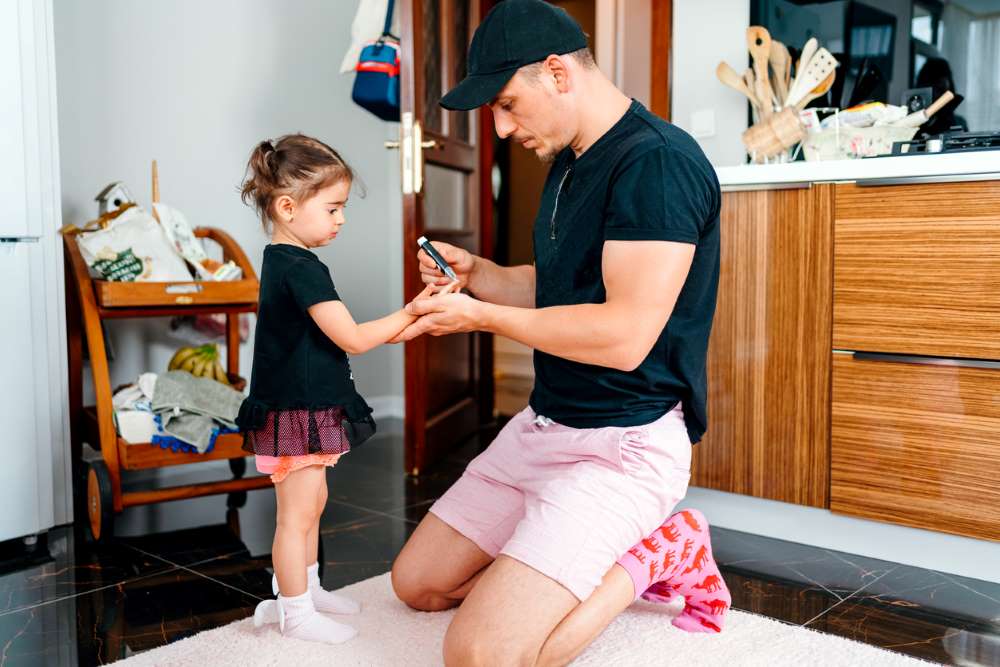
If you are a parent of a child who has been diagnosed with type 1 diabetes, you know how life-altering those 3 words truly are. Hearing “your child has diabetes” is frightening, especially since public knowledge is lacking about this type of diabetes. Once you learn what exactly it entails, and how much time and energy will need to be dedicated to it, by both you and your child, you may feel a whole host of emotions. As parents, we would do anything to keep our child out of harm’s way, so it’s difficult not to feel like it’s your fault but you could not have stopped it from happening. I repeat, nothing you could have done would have resulted in a different outcome.
Type 1 diabetes is a 24-hour, 7-day-a-week job and regardless of the age of your child, you will likely be involved slightly or very involved. Essentially, you will work to become your child’s pancreas. This is emotionally taxing and it’s going to take mental, emotional and physical strength to be up for this tall ordered task.
Here are 6 ways that will help a parent to navigate their child’s new diagnosis of type 1 diabetes:
Come to Terms
It is not abnormal to go through the grieving process following a diagnosis of any kind. Even though your child is still perfectly healthy, there is a loss of innocence that goes along with taking on such a big responsibility. Let yourself go through the stages of grieving and once you reach acceptance and come to terms with this as a part of your lives, you will be ready for the next step. It took me about a year to come to accept that I was now living with type 1 diabetes. Even at 37, it was very hard to grapple with. Once I got to a better place with it, I felt empowered to take on the daily management in stride.
Education Is Key
I am fascinated that people who have diabetes for 50+ years are still asking questions about working out and blood sugars, adjusting insulin doses, etc. What this shows me is that diabetes is a dynamic disease and we must continue to make our best effort and adapt. We must educate ourselves the best we can by reading diabetes books, watching videos, and gaining the support of the diabetes online community. Once you are equipped with the knowledge on how to best manage this condition, you can find the style that fits your child and their lifestyle and what works best for you and your family. For me personally, I learned more about my body, diet and exercise than I ever would have without this diagnosis. I embraced low-carb, tried keto for a while, and am currently in a healthy mindset of eating low-carb. I also learned that exercise affects blood sugar, and depending on what type of exercise you are doing you can either spike or go low.
Control It, Don’t Let It Control You
If your child plays a sport, you can figure out the best way to manage their blood sugars. If your child is an adventure seeker and loves to bungee jump, you can figure out a way to dose for those crazy adrenaline spikes. Maybe your child has special needs and it isn’t easy to figure out what they will be eating and how you need to adapt to that situation. No matter what the obstacle is, there are numerous resources, and with the help of your doctor and the knowledge and tools from the diabetes online community (DOC), you will figure out how to problem-solve. You are not alone. For example, I am a night time-eater. I find myself less hungry and busier during the day so I tend to eat more at night. This makes managing my blood sugars more challenging while I sleep. Instead of changing my eating habits, I figured out how to make use of technology to help me tighten my control during these times.
Breathe
A disease like this with so many layers is one that you will not learn everything overnight. And once you do learn the ropes, things may change so you need to stay on your toes. Having grace with yourself and knowing that you and your child aren’t perfect will help both of your relationship with diabetes and each other. Taking time to enjoy life and not having diabetes as the focus of everything is so important for our mental and emotional health. It isn’t easy to act as a pancreas day in and day out. I find I go through periods where I am more lackadaisical with my care. While this isn’t ideal, it is okay to take a mental health break while also still being safe and smart. Burnout is common and it is important to remember you aren’t perfect and always to be kind with yourself.
Focus on the Basics
There are tasks that you, or your child, will have to do every day. It is important to instill this behavior in your child so that they take these good habits with them when they go out on their own. Making sure they get physical activity, check their blood sugars, eat a healthy diet and take insulin are best practices that can ensure good overall diabetes care. I find that once I have a routine in place, I act on autopilot. I instilled good habits early on in my diagnosis that I plan to carry through for many years to ensure that I am doing the best I can for my overall diabetes management, on a daily basis. It’s really a marathon, not a sprint, so instilling good habits is key.
Seek Support
It wasn’t until I found the DOC that my perspective on my life going forward with type 1 diabetes changed for the better. I no longer felt alone, I saw people still healthy despite living with the condition for 40+ years. I learned things I never could have learned from my endocrinologist, who does not live with type 1 diabetes, and I highly recommend forming relationships and seeking advice from others living with this disease. This has improved my overall management and outlook significantly.
Also, when a child is diagnosed with diabetes, it oftentimes becomes a family affair. Many families find it easier if everyone in the family eats the same foods to avoid the child feeling left out or alone. Many families also enlist the help of grandparents, friends and neighbors so everyone is aware of what your child may need given an emergency situation.
Being vocal about your child’s new diagnosis and the severity of it can wind up calming your nerves in the future. Trust me on this.
Learning to accept and cope with the demands of type 1 diabetes isn’t easy and even more complicated when it is your child. Making sure your child feels loved, confident in their (age-appropriate) ability to manage their disease and that they are able to enjoy life without diabetes continually getting in the way is the goal of any parent or caregiver.
Coming to terms with this diagnosis isn’t easy and there is no right way or timeline for the process. Letting yourself go through the stages of grief to reach acceptance will get you where you need to be when the time is right. Until then, please consider these helpful tips when coming to terms with a chronic diagnosis of any kind.



























